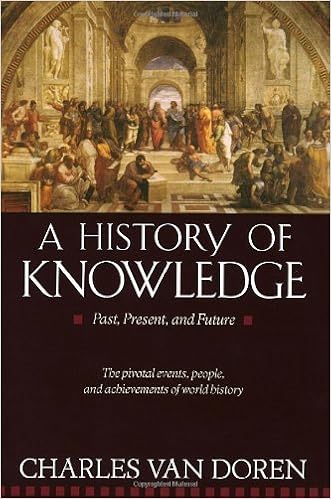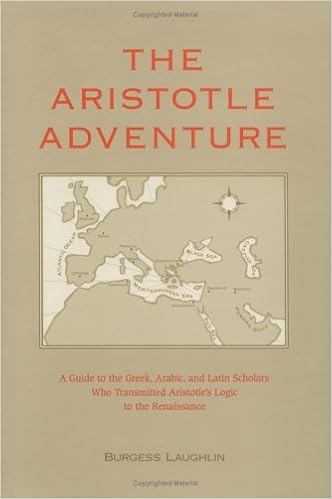Guest post by Andy Clarkson
Five years ago, President Barack Obama delivered a speech in Cairo, Egypt, whose many errors are still widely embraced today. He declared “civilization's debt to Islam” and sought “common ground” between Islam and the United States, arguing “they overlap, and share common principles”. “Islam has a proud tradition of tolerance,” he said, and its culture and its many innovations have “given us majestic arches and soaring spires; timeless poetry and cherished music; elegant calligraphy and places of peaceful contemplation.”
Analysing the speech and its context five years later, this post looks at some of the innovations and contributions and their ultimate source, and examines what is and what is not in common with the Arab world of 1000 years ago and the United States of America.
The post is based on Mr Clarkson’s notes written on that day.*
 In A History of Knowledge (page 103), Charles van Doren writes:
In A History of Knowledge (page 103), Charles van Doren writes:
It was in Alexandria that the Muslim Arabs first came into close contact with Greek culture. They immediately fell under its spell. They soon became noted mathematicians, astronomers, and physicists, and they continued the work begun even before the fall of Rome decoding and interpreting Greek scientific thought.
Note the use of Van Doren's term "Muslim Arabs". While these Arabs were Muslims, they adopted the Greek mind - at least to the degree to which they used Aristotelian logic. They were transformed by the reason of Aristotle. But, no doubt these were men of mixed premises
In A History of Philosophy (page 316), Wilhelm Windelband noted:
(W)e must not...overestimate the independent achievements in individual Arab medicine and natural sciences. Here, too, the science of the Middle Ages is essentially learned tradition. The knowledge which the Arabs were later to deliver to the West had its origin, in the main, in the books of the Greeks.
Nor did even experimental knowledge experience an essential extension through the Arabs' own work; only in some fields, as, for example chemistry and mineralogy and in some parts of medicine, e.g. physiology, do they appear more independent. In their method, however, in their principles by which they apprehend the universe, and in their entire system of philosophical conceptions, they stand, so far as our information on the subject reaches, entirely under the combined influence of Aristotelianism and Neo-Platonism...
The Arabs of that time do deserve praise for their translation of Aristotle's works. As a result of their support for the ideas of Aristotle, the Arab world flourished. The eventual result was that the writings of Aristotle spread to Paris and throughout Europe. This European expansion led to the decline of the mysticism of the Dark Ages, and to the emergence of the reason-based Renaissance and Enlightenment. This led to the science of Galileo and Newton and to Renaissance art. The Enlightenment provided the philosophical and cultural atmosphere for the political formation of the United States of America.
 Writes Dr. Leonard Peikoff in his book Objectivism: The Philosophy of Ayn Rand:
Writes Dr. Leonard Peikoff in his book Objectivism: The Philosophy of Ayn Rand:
...(T)he United States with its unique system of government could not
have been founded in any philosophically different period. The new
nation would have been inconceivable in the seventeenth century, under
the Puritans, to say nothing of the twelfth -- just as, the power of
tradition apart, its selfish, absolutist individualism would never survive
a vote today (which is why a second Constitutional convention would be
a calamity). America required what the Enlightenment alone offered:
enlightenment. (The Duel between Plato and Aristotle, Objectivism:
The Philosophy of Ayn Rand, p 453).
*That* is the common ground between the Arab world of a thousand years ago and the United States of America. The common ground is the transfer of Greek thought (reason) taken from idea to action.
And for this, we must admire certain Arabs of that time period. We must especially admire Aristotelian Arab philosophers such as Averroes (Ibn Rushd). From Windelband, (p. 317):
But the most important and independent among Arabian thinkers was
Averroes. He treated in paraphrases and longer or shorter commentaries,
which were printed in the older editions of Aristotle, almost all the didactic
writings of Aristotle, who was esteemed by him as the highest teacher of truth.
So while Greek thought had a great influence upon Arab culture of the Dark Ages, it was not entirely Aristotelian. Burgess Laughlin wrote in the The Aristotle Adventure (p 112):
Aristotle's logic entered the Arabic-Islamic cultural stream beginning c. 850. Conflicts appeared quickly between theologians who disavowed all philosophy, and the theologians who wanted both revelation and reason. The struggle between them continued for centuries.
It was clearly a culture of mixed premises. And today we can see the real impact of Islam on the Arab world. Continues Laughlin (pp 117-119): "For 200 years after the introduction of ancient Greek philosophy into Arabic culture, c. 850, Islamic theologians reacted against it. Their strength grew slowly and steadily like an avalanche of mud.
At the peak of that reaction, Al-Ghazali of Khurasan...began his scholarly career by studying philosophy and logic...To attack philosophy, Al-Ghazali picked three targets. His first target was Aristotle (the master of philosophy)...Al-Ghazali's and other scholars' persistent attacks on philosophy (and on philosophy's tool, logic) weakened support for philosophy in Arabic culture in the east for the next 200 years...For Arabic culture in the east, Islam (that is, submission to God) not philosophy (with logic as its tool), was to be man's guide in this world.
 Windelband provides additional evidence of the struggle between Aristotelian and Islamic thinkers. (Page 317):
Windelband provides additional evidence of the struggle between Aristotelian and Islamic thinkers. (Page 317):
Avicenna (Ibn Sina)...whose 'Canon' became the fundamental book of mediaeval medicine in the West, as well as in the East, and who also exercised a powerful influence by his extremely numerous philosophical writings, especially his Metaphysics and Logic. His doctrine comes nearer again to pure Aristotelianism, and perhaps the nearest among all the Arabians. But the extension of these philosophical views was regarded with jealous eyes by Mohammedan orthodoxy, and the scientific movement experienced so violent persecutions in the tenth century that it took refuge in the secret league of the "Pure Brothers". Avicenna himself was also persecuted.
Is this "tolerance" Mr. President? "Violent persecutions" by Mohammedan orthodoxy? This is not "peaceful contemplation" Mr. President.
 Burgess Laughlin describes the conclusion of Aristotelian influence (that is of reason -- the foundation of medicine, science, mathematics, and everything good) in Arab-Islamic culture on page 124 of The Aristotle Adventure:
Burgess Laughlin describes the conclusion of Aristotelian influence (that is of reason -- the foundation of medicine, science, mathematics, and everything good) in Arab-Islamic culture on page 124 of The Aristotle Adventure:
After the two contemporaries, Ibn Rushd (Averroes) and
Ibn Maimun (Maimonides), no significant Arabic
philosophers (Aristotelian or otherwise) appeared in
Islamic culture -- ever. In Islamic-Spain, the study of logic
and philosophy (as parts of 'alien learning') became
extinct, extinguished by popular and theological hostility to
non-Islamic culture."
The result of all this is the total absence of progress in the Arab world for the past eight-hundred years!
With the extinction of Aristotelian logic and the rise of Islamic ideology and theocracy, most of the Arab world remains in a primitive state. The only progress in the Arab world since then, which has taken place in the past 50 to 100 years, is due to the Aristotelian logic of Western engineering in the oil fields made productive by American and European corporations.
Those recent achievements, just as the achievements of a thousand years ago, are the result of Greek thought. And all those achievements are possible, not because of, but in spite of Islam. Civilisation owes nothing to Islam. It owes everything to the Greek philosophy that by an accident of history was once incubated in Islamic countries.
It was Arabs qua Aristotelians and not Arabs qua Islamists who are responsible for the accomplishments of Arab Muslims.
Barack Obama denies the reality of medieval Arab culture by praising Islam itself as a tool of modern progress. To deny the fact that Islam is the consistent killer of human thought and action is a disgrace. It is a disgrace because Obama attacks not only the true instrument of human progress, but because he also attacks the philosophical and historical roots of the country in which he is president. That instrument of human progress and the philosophical root of the US are one and the same -- the faculty of reason.
There are not many larger philosophically fundamental frauds ever committed by an American president than the one committed by President Barack Obama five years ago.
The United States of America is at war, not only on the battlefield, but also in the realm of ideas. We are in an on-going cultural war between reason and faith. This US president sided with the enemy.
RELATED POSTS:
- The Greatest Story Hardly Ever Told – NOT PC, 2010
- “So, How Come You Keep Bashing Religion?” – NOT PC, 2014
Andy Clarkson is the convenor of the Facebook Group The Impact of Aristotle Upon Christian, Islamic & Jewish Cultures, where this post first appeared, and which you should join.
* Andy Clarkson would like to thank Boaz Arad-Erder for reclaiming these notes. “The original English version disappeared off the websites where they were published -- nothing sinister, but not worth repeating here. Fortunately, Boaz on that day in 2009 translated them into Hebrew and published on various sites in Israel. This summer he provided me the Hebrew version and using Google Translate, I was able to get most of it back. And then with some tweaking, they are very close to their original version. I hope you enjoy.”

No comments:
Post a Comment